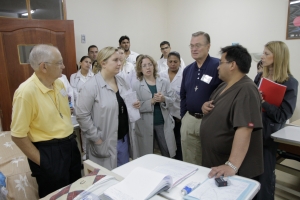Teach a man to fish and you have fed him for a lifetime
The impact of medical mission work is not only in the immediate healing of patients in the clinic and in surgery but in the education that happens while we’re here. Like the ripples emanating from the stone thrown in the water, so is the power of teaching. The effects are realized well beyond the original source. Empowering the people we work with and patients we serve with knowledge to provide better medical care and improve their health is the aspect of medical mission work that excites me most.

There have been many formal presentations to nurses, medical students and dentists by our team members. The Bolivian clinicians are so engaged at these talks – they ask great questions, they listen attentively and really take advantage of this opportunity to learn.
Informal teaching happens all day long. The clinic doctors educate their patients and families at each visit. The surgeons work side by side in the operating room and on rounds each morning to assess the patients’ post-operative recovery.
Anyone in the medical profession knows the adage, “see one, do one, teach one.” This is one of the primary ways medical education occurs. On this note, today I saw a wonderful interaction during a gynecological surgery. One of the Bolivian surgeons, Dr. Choque, was operating under the tutelage of Dr. Bob LaPata and Dr. Carrie Giordano. Dr. Choque was learning a new procedure. He had watched one and he had done one and today Dr. Giordano said “Dr. Choque, it’s time for you teach this procedure.” He proceeded to teach another Bolivian surgeon while he performed the rest of the case.
The teaching and learning goes both ways. The mission team has related numerous examples of the resourcefulness and creativity of the Tiquipaya staff and doctors. For example, they ran out of foley catheter bags in the OR and a Bolivian nurse quickly resolved the problem by using a latex glove as a substitute bag! The lack of resources breeds resourcefulness. There is always a solution to a problem. And from the patients…we have all learned something about acceptance, gratitude and patience. Paraphrasing from Dr. Dan Lum, “every time I come here, I leave with more than I gave.”


